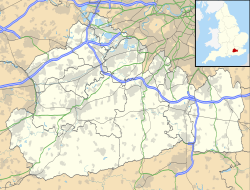St Dunstan's Church, Woking
| St Dunstan's Church | |
|---|---|
 The church from the southwest | |
| 51°19′09″N 0°32′43″W / 51.3192°N 0.5453°W | |
| OS grid reference | TQ0147858775 |
| Location | Shaftesbury Road, Woking, Surrey |
| Country | United Kingdom |
| Denomination | Roman Catholic |
| Website | St-Dunstans.org |
| History | |
| Status | Active |
| Dedication | Dunstan |
| Dedicated | 22 October 2008 |
| Architecture | |
| Functional status | Parish church |
| Completed | 8 August 2008 |
| Administration | |
| Province | Southwark |
| Diocese | Arundel and Brighton |
| Deanery | Woking[1] |
St Dunstan's Church is a Roman Catholic Parish church in Woking, Surrey. At first, it was built in 1899. It was replaced by a larger church in 1923 and again in 2008. The most recent church was dedicated in 2008 by the Bishop of Arundel and Brighton and Cardinal Cormac Murphy-O'Connor. It is situated on the corner of Shaftesbury Road and Pembroke Road outside the centre of Woking. It is the only Catholic church in the town and is the centre of the deanery of Woking in the Diocese of Arundel and Brighton.[1]
History
Percy Street
In 1850, there was the Restoration of the English Catholic hierarchy. However, there was no place of worship for Catholics in Woking. Instead, Catholics travelled to Send or to St. Edward the Confessor Church in Sutton Green to celebrate Mass.[2]
In 1899, a Fr W. D. Allanson built an iron church in Percy street, Woking, dedicated to St Dunstan.[3]
Heathside Crescent

In 1923, a Fr. Plummer replaced a Fr. John Peall as parish priest and wanted a new church to be built in the Gothic Revival style. Plans were soon drawn up and on 26 April 1925, Bishop William Brown, Auxiliary Bishop of Southwark and Titular Bishop of Pella of laid the foundation stone at the new site on Heathside Crescent. The church was designed by Joseph Goldie. It was completed on 8 December that year. In 1954, Fr Plummer died and was buried in the grounds of the church.[2]
The church congregation grew during the 20th-century so that other Catholic churches had to be established in the surrounding area. St Hugh's Church in Knaphill was opened in 1907, Our Lady Help of Christians Church in West Byfleet in 1954 and Our Lady Mother of God Church in the Kingfield area of Woking in 1962.[2]
After the Second World War, many Italian immigrants came to work in Woking. In 1973, Masses in Italian were held on Sunday for the community. In 1953, the first parish school was opened, then in 1958 St Dunstan's School was opened and then St Francis School in 1973. In 1993, they were combined to form St Dunstan's Primary School.[2]
Shaftesbury Road
When St Francis School was closed, its site on Shaftesbury Road was not sold, but retained. In 2003, the decision was made to develop the site to build a new church that would replace the Our Lady Mother of God church and St Dunstan's on Heathside Crescent.[2]
In 2006, construction work began. In March 2006, Our Lady Mother of God Church was closed in anticipation of the new church being built. On 13 July 2006, as part of the redevelopment of parish facilities, Bishop Kieran Conry moved the remains of Fr Plummer to St Edward the Confessor Church in Sutton Green.[2]
On 8 August 2008, the building was completed and the first Mass was celebrated the next day. The new church was dedicated on 22 October 2008 by the Bishop of Arundel and Brighton, Kieran Conry and Cardinal Cormac Murphy - O'Connor.[2]
Parish
The church has a close relationship with St. Dunstan's Primary School.
The church has five Sunday Masses every week, 6:00pm on Saturday evening (for Sunday), 9:00am, 10:30am Sunday morning, an Italian Mass at 12 noon and a Sunday evening Mass at 5:30pm. There are weekday Masses from Monday to Saturday at 10:00am[4]
See also
References
- ^ a b Deaneries from Diocese of Arundel and Brighton retrieved 16 September 2013
- ^ a b c d e f g "St Dunstan's Catholic Church, Woking: Parish History". St Dunstan's Catholic Church, Woking. 29 June 2015. Archived from the original on 13 October 2015. Retrieved 13 October 2015.
{{cite web}}: Unknown parameter|deadurl=ignored (|url-status=suggested) (help) - ^ Woking from British History Online retrieved 16 September 2013
- ^ http://www.st-dunstans.org/







